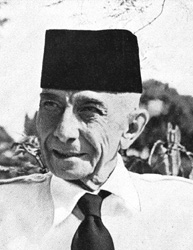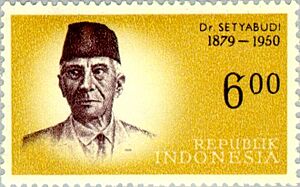Ernest Douwes Dekker facts for kids
Quick facts for kids
Ernest Douwes Dekker
|
|
|---|---|
 |
|
| Born |
Ernest François Eugène Douwes Dekker
8 October 1879 |
| Died | 28 August 1950 (aged 70) Bandung, West Java, Indonesia
|
| Occupation | Politician Writer |
| Spouse(s) | Clara Charlotte Deije Johanna Petronella Mossel Haroemi Wanasita (Nelly Kruymel) |
Ernest François Eugène Douwes Dekker (born October 8, 1879 – died August 28, 1950) was an important figure in Indonesia's fight for freedom. He was part Indonesian and part Dutch. He is also known by his Sundanese name, Setyabudi or Setiabudi.
Ernest was related to a famous Dutch writer named Multatuli. Multatuli's real name was Eduard Douwes Dekker. In his younger days, Ernest even fought in a war in South Africa. His ideas greatly influenced the early movement for Indonesian independence.
After Indonesia became independent, he officially changed his name to Danoedirdja Setiaboedi.
Contents
Early Life
Ernest Douwes Dekker was born in Pasuruan, a town in Java. His father, Auguste Henri Edouard Douwes Dekker, was Dutch. His mother, Louisa Margaretha Neumann, was half-German and half-Javanese. This mixed background is called Indo (Eurasian). Ernest's great-uncle was the famous writer Multatuli, who wrote Max Havelaar.
Ernest went to school in Pasuruan, then Surabaya, and later Batavia. In 1897, he finished school. He started working on coffee and sugar plantations in East Java. There, he saw how hard ordinary Javanese people worked. This experience helped shape his views.
Fighting in South Africa
In 1900, Ernest and his brothers decided to join the Second Boer War. This war was in South Africa. They went to Transvaal and became citizens there. Ernest believed the Boers were being attacked by the British. Since he also had Dutch roots, he felt he should help them.
During the war, British soldiers captured him. He was sent to a prison camp on an island called Ceylon. Ernest was later set free. He returned to the Dutch East Indies in 1903.
Working for Indonesian Freedom
When Ernest came back to the Dutch East Indies, he became a journalist. He worked in Semarang and Batavia. He became friends with Karel Zaalberg, another Indo activist. Unlike many Europeans, Ernest did not support colonialism. He strongly believed that the Dutch East Indies should manage itself. He wanted it to become fully independent. His experiences on the plantations and facing discrimination as a mixed-race person made him feel this way.
Starting as a Journalist
Ernest wrote many articles about independence. He also wrote about "Indies nationalism." In 1913, he and his friends, Tjipto Mangunkusumo and Suwardi Surjaningrat, started a group. It was called the Native Committee in Bandung. This group later became the Indische Partij. This was a big step because most groups at the time did not openly ask for independence.
The party quickly grew to about 7,000 members. Most of them were Indos, and about 1,500 were native Indonesians. The Dutch government became worried. They quickly banned the party. Because of this, Ernest and his two Javanese friends were sent away to the Netherlands.
Forming the Indische Party
While in exile, they worked with Dutch students and other supporters. It is thought that the word Indonesia was first used by a student group they were part of. This group was called the Indonesian Alliance of Students. Even though his party was banned, it inspired new groups. One of these was the 'Indo Europeesch Verbond', which also wanted independence. Many former members of the 'Indische Partij' joined this new group.
In 1918, Ernest was allowed to return home. He helped change the 'Insulinde' party into the 'National Indische Party' (NIP). He became a key leader of the NIP. But after the NIP was involved in a farmers' strike, the Dutch government put him in prison again in 1921.
Teaching and Inspiring
After being released in 1922, Ernest started teaching in Bandung. Two years later, he became the head of the school. He renamed it the "Ksatrian Institute." The government officially recognized his school in 1926. Sukarno, who later became Indonesia's first president, was a teacher at one of Ernest's schools.
Ernest kept fighting for independence. He shared his ideas with other thinkers, including Sukarno. Sukarno looked up to Ernest as his teacher. However, Ernest's influence later became less strong. This was because of the rising power of Sukarno's Indonesian National Party (PNI) and other groups.
During World War II, the Dutch saw Ernest as a dangerous activist. They sent him away to Suriname. He spent years in a forest prison camp there. Ernest returned to Indonesia on January 2, 1947.
Later Years and Legacy
After coming back to Indonesia, Ernest became a member of the provisional parliament. This was called Komite Nasional Indonesia Pusat. In February 1947, he changed his name to Danudirja Setiabudi. This name means 'powerful substance, faithful spirit'.
In December 1948, Dutch troops arrested him again while he was sick. But they released him because of his poor health.
Ernest spent his last years in Bandung. He wrote his autobiography, 70 Jaar Konsekwent. On his seventieth birthday, he saw the Dutch formally give power to Indonesia in 1949. This made him very happy. He passed away eight months later in 1950.
A Lasting Hero
In Indonesia, Ernest Douwes Dekker is still honored as a national hero. A district and a main street in Jakarta are named Setiabudi after him. There are also train stations named Setiabudi. In Bandung, there is also a main street called Setiabudi. Another street is named Ksatrian, after his school.
President Sukarno officially recognized him as one of the National Heroes of Indonesia.
His life story is told in a book called Het Leven van EFE Douwes Dekker. It was written by Frans Glissenaar in 1999.
See also
Other Indonesian authors
- Louis Couperus (1863–1923)
- Victor Ido (1869–1948)
- Maria Dermoût (1888–1962)
- Edgar du Perron (1899–1940)
- Beb Vuyk (1905–1991)
- Rob Nieuwenhuys (1908–1999)
- Tjalie Robinson (1911–1974)
- Ernst Jansz (1948– )
- Marion Bloem (1952– )
 | Roy Wilkins |
 | John Lewis |
 | Linda Carol Brown |


